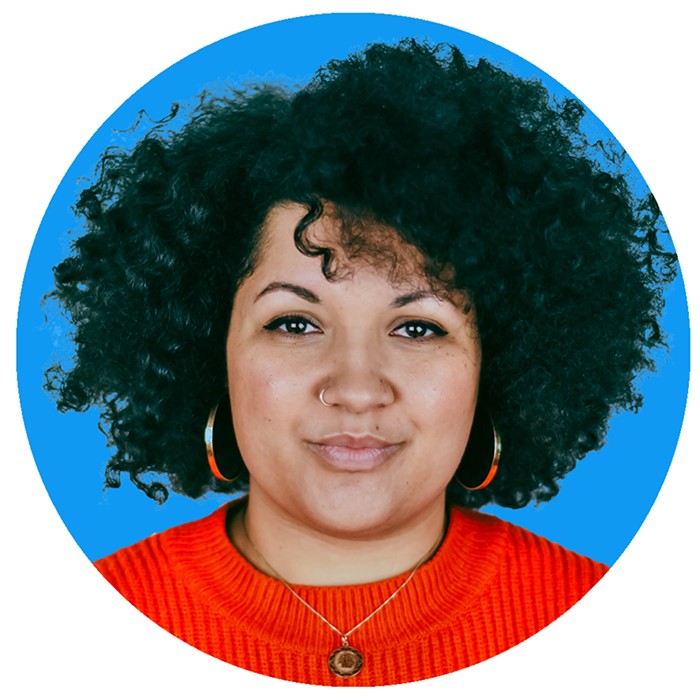When I say Blossom’s sophomore album Maybe is dreamy, I mean it literally. If this project were, say, a cannabis plant, it’d definitely be a heavy indica: a downer (in a good way), and more relaxing than energizing. The whole project has a late-night/early-morning vibe. As someone who’s made a habit of listening to records ever-so-softly on loop while I sleep, I can attest that Maybe is perfect for that. (And the “Casual day and I’m rolling up/Casual day and my life’s still tough” refrain from one of its lead singles, “Moi å Moi,” would make for a perfectly gentle alarm clock.) Or, alternately, pop in some earbuds and play Maybe during a pedicure (or other spa treatment)—I guarantee it’s more relaxing and enjoyable than those corny instrumentals of “I Will Always Love You” they like to play in the nail shop.
In a 2017 Mercury interview that discussed her debut album Tease, Blossom acknowledged she’s not a powerhouse vocalist, saying it took her time to lean into her own style as a singer. Blossom’s voice—while sultry, raspy, and pleasing—doesn’t require one to strain their voice in order to sing along. Inside the neo-soul bubble, she’s less of a high-soaring SZA or a run-heavy H.E.R., and more in line with even-toned singers like Jamila Woods or Erykah Badu.
In contrast to the singer’s vibrant and gregarious personality, Blossom’s chill, soul-derived delivery allows space for instrumentation and production to shine. Maybe is almost entirely produced by EYRST labelmate Neill Von Tally (there’s some added help from Dr. Danger, Snugsworth, and Damon Boucher), giving the project a cohesive feel and a celestial backdrop that’s an even match for Blossom’s low-toned, whimsical vocals. The 12-track project packs less of the lighthearted, catchy bops sprinkled throughout Tease, replacing them with a deeply introspective and experimental sound that finds Blossom more explicitly baring her life, intimate thoughts, and feelings.
Released on her 30th (and golden!) birthday, Maybe shows Blossom—AKA Keisha Chiddick—is not afraid to switch it up in order to express herself more fully, nor is she shying away from putting her foot down in the name of grown-woman shit, self-love, and self-respect. On “Anxiety,” she sings: “Maybe I’m a mess in a dress/But you’re a fuckin’ dick who cares less/’Bout who you hurt/And who you burn/Lesson learned.” Blossom continues, “Cry all you want/There’s nothing left to see/You cut out my heart/You’re no friend to me.”
There’s also the saucy track “Betty Rizzo,” which is in part a nod to an obsession with the film Grease (the song references “a hickey from Kenickie”) with Blossom singing in her low alto, “My girl sure can get down/My girl sure can get around.” Other highlights include lead single “Career Suicide” (“Ran full speed into a starship”); the excellent percussion throughout “Glitch” (and the breakdown that happens around 2:25, and then again at 3:55); and the catchy “LaDiDa,” which tells the partially censored story of “riding high and fast” in a car with a lover. On “Honey, If You Hear,” Blossom questions—via an interesting melody—if a relationship is real love, or if maybe it’s just an emotional security blanket. The track includes the sole featured verse on the album from frequent collaborator Ripley Snell that makes subtle references to their home base of Portland (“I’m just posted in the numbers/Singin’ with my shirt open like I’m Usher/Yeah, do this every summer”).
As to which track is my favorite, I’m going with the especially lovely, mellow, and ethereal album closer, “Suul.” Here, Blossom’s vocals are particularly soft and gorgeous, wandering through twinkling, instrument-heavy production to eventually float in a space of exquisite self-reflection. Listening to it is like seeing a beautiful sunrise after a long night: It brings a sense of clarity with the onset of drowsiness. The ways of the world start to make sense, and you understand why sometimes, with relationships, you have to learn things the hard and emotional way.














